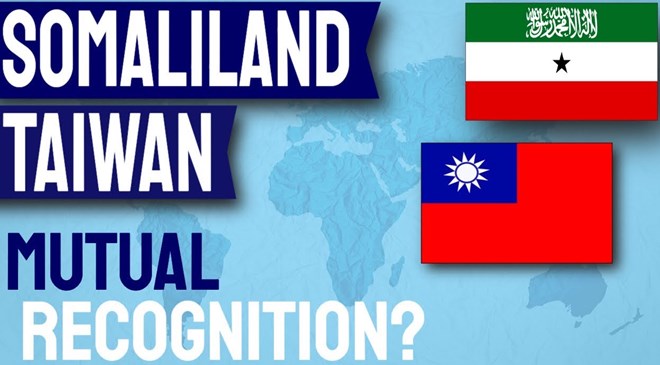Wednesday July 15, 2020
By Abdirahman M. Dirye

Somaliland was largely off the global radar until its government signed a non-binding multimillion dollar business-cum-military contract with DP World of the UAE to run Berbera Port, and to use Berbera’s civilian airport as a launching pad in the Yemeni civil war.
Another bold step taken by Somaliland is the more recent “suicidal” agreement with Taiwan, agreeing to exchange representative offices in two supposed ‘secessionist’ states with very little in common except for a lack of international legitimacy.
The similarities ended there. There are no more.
Taiwan occasionally claims to be a legitimate entity representing all Chinese people, including those on the Asian mainland, while Somaliland wants nothing short of outright independence.
Taipei and Hargeisa are in direct stark contrast: the former is an advanced metropolitan city with hi-tech industries and British, American and Australian educated residents, while the latter is a medieval waterless slum with dusty, bumpy roads.
Taiwan declaring office inauguration might therefore offer a life support system to Somaliland’s dying cause under an ongoing blockade by Somalia; and as a result, Somalilanders’s have seen their morale and concept of unity rise to an all time high; the international media and press mentioning Somaliland in their headlines is of huge importance to Somalilanders.
As joyous as this is, however, what does Somaliland stand to gain from this relationship, other than China’s ire and rhetoric?
Rhetoric is what Somaliland needs right now, but I don’t know what Taiwan wants.
The West has not really commented on Somaliland’s steps in promoting ties with Taipei, but they soon took notice when China undermined Hong Kong “democracy”.
Many have said Somaliland has made this move, not to benefit, but to upset Somalia – but remember, Somaliland’s purchasing power is almost on a par with Chad, and it is also one of the least populated ‘countries’ in the world.
We can’t afford any Taiwanese gadgets, automobiles, machinery, and consultation services, or even educational systems.
One look at Somaliland markets, and visitors will realize we are a dumping ground for Chinese mass produced products.
In Hargeisa we even have Chinese businesses run by Chinese, but not a single Taiwanese item or person has yet dared set foot here because of the notoriety of our regional volatility: Ethiopia is descending into turmoil on one side, while Somalia has lurched from crisis to crisis and disaster to disaster for decades on the other.
Around two years ago, a travel writer from Japan made a visit to Hargeisa, the capital.
Along with three others, I drove to the Hargeisa outskirts to chew khat, (a soft stimulant popular here). We spoke in our language, and he thought we were plotting to kidnap him.
All of a sudden, he jumped out of the car after it slowed in a traffic jam. He never called us back.
Somaliland is a victim of the notoriety of our next door neighbour.
But can Somaliland’s “love affair” with Taiwan lead anywhere except for three or four headlines that will soon be forgotten, and a relationship that will be forgotten altogether?
Many Somalilanders fear this, as China may opt to arm Somalia to help them invade Somaliland.
This country, unlike Taiwan with its promises of military protection from the West, particularly the US, is politically, economically, and militarily vulnerable.
This “suicidal” policy of linking to Taiwan was soon followed by another: Somaliland’s reckless leaders circulated the belief that Russia was about to build a military base in Berbera to annoy the US and its allies.
This story vanished almost immediately.
As such, this mentality of looking for headlines, just as this high profile relationship with Taiwan, a land with as little recognition as Somaliland, is an exercise in futility.
Meanwhile, swimming in an ocean of money, and amidst a rearmament drive, our neighbor Somalia is now holding its head up again, and is letting the world know it is doing its best to put Somalia, led by Mogadishu, back on the world map while Somaliland reverts to the clannish divisions of old days in our halls of power.
Abdirahman M. Dirye is a writer living and working in Hargeisa, Somaliland where he is the co-editor of Somaliland.com, an online newsletter. He can be followed on Twitter at: @mrdirye